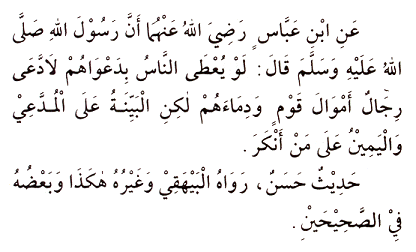

|
|
[This page was last updated: 19/10/02]

Ibn 'Abbas, radiyallahu 'anhu, said that the Messenger of Allah, sallallahu 'alayhi wasallam, said:
"Were people to be given according to their claims, some
would claim the wealth and blood of others. But the burden of proof
is upon the claimant and the taking of an oath is upon the one who denies
(the allegation)."
[An excellent hadith which al-Bayhaqi and others have related.
Parts of it is in the two Sahih books (i.e. in al-Bukhari and Muslim).]
background
There are in every judicial dispute at least two litigating parties, the plaintiff and the defendant. The first claims what is contrary to the apparent fact; the second holds to the apparent fact and denies the claim. (Mahmassani: Falsaft al-Tashri' al-Islami - p 169, 170).
![]()
This hadith
forms an important maxim. The text of the hadith has been expressed
in the following way:
"Evidence is for the person who claims; the oath is for the person
who denies."
(The Mejelle 1967 article # 76)
lessons
This hadith shows the supreme importance of proof to the administration of justice. The necessity of proof is a restrainer to false, weak, and unsubstantiated claims. (Mahmassani 168).
Therefore it becomes important to know upon who the onus of proof lies. There is no doubt that the burden is upon the plaintiff. This is explained by the fact that what is apparent is presumed to be the original state; any one who makes a claim to the contrary must prove such claim. (ibid)
The proof of a matter requires presentation of evidence until the matter attains the degree of certainty. Certainty is that which can be established by sight or proof. It can only be dispelled by another certainty. (ibid)
Since it is established that a defendant is presumed to be free from liability until the claimant proves the contrary, it is important to know who is the defendant and who is the plaintiff, who of the two must bear the onus of proof, and whose evidence takes precedence in case of conflict. (ibid p172).
![]()
The definition of "Plaintiff" and "Defendant"
There are three views regarding the above issue (Zarabozo 3/ 1167):
![]()
The meaning of al-Bayinah or "proof" (ibid)
Many jurists seem to think that "proof" refers only to witnesses. However, the meaning of proof is much more comprehensive and also applies to means of proof other than witnesses.
According to some early and contemporary scholars, "al-Bayinah" or proof is a noun that encompasses all means of establishing the truth. Circumstantial evidence, conclusive presumption, and clear signs that lead to a definite conclusion can all be taken into consideration .
Modern forms of criminal investigation can be used in making judicial conclusion. Otherwise, rights will be lost and injustice will be allowed to prevail.
![]()
The criteria for being an acceptable witness (ibid)
![]()
The importance of giving one's testimony
It is an obligation that people offer their testimony truthfully when called upon to do so. Allah the Almighty says:
And the witness should not refuse when they are called.
[Surah al-Baqarah: Ayah 282]
It is considered a sin to conceal what one has witnessed. Allah tha Almighty says:
And conceal not the testimony, for he who hides it is certainly
sinful of heart.
[Surah al-Baqarah: Ayah 283]
![]()
A warning to those who make successful false claims
It is noted that Islam stresses on appealing to fearing Allah whenever there is misuse of authority, or taking chances over others in all human relations such as trading, family disputes, and making false claims against others.
The Prophet, sallallahu
'alayhi wasallam, said:
"I am a human being. You come to me as litigants. Perhaps, one of
you is better in presenting his argument than the other and I decide in
his favour according to what I have heard. If I have decided anything
for someone from the rights of his brother, he should not take it for
I have portioned for him a portion of the Hell fire."
In another hadith the Prophet, sallallahu 'alayhi wasallam, warns us that taking as little as a spin of a palm of some one else's property unjustly will be horribly taken responsible for in the Day of Judgment.
In a third hadith the Prophet, sallallahu 'alayhi wasallam, cursed the one who changes for no good reason the landmarks of a property.
conclusion
Islam
is a practical religion where it takes into account the possible natural
conflicts, quarrels, and disputes among community individuals where people
may claim something against one another. Islam establishes rules and principles
by which these disputes are brought to an end in a just manner.
A person is free of guilt or claims made against him or her until proven
otherwise.
|
|